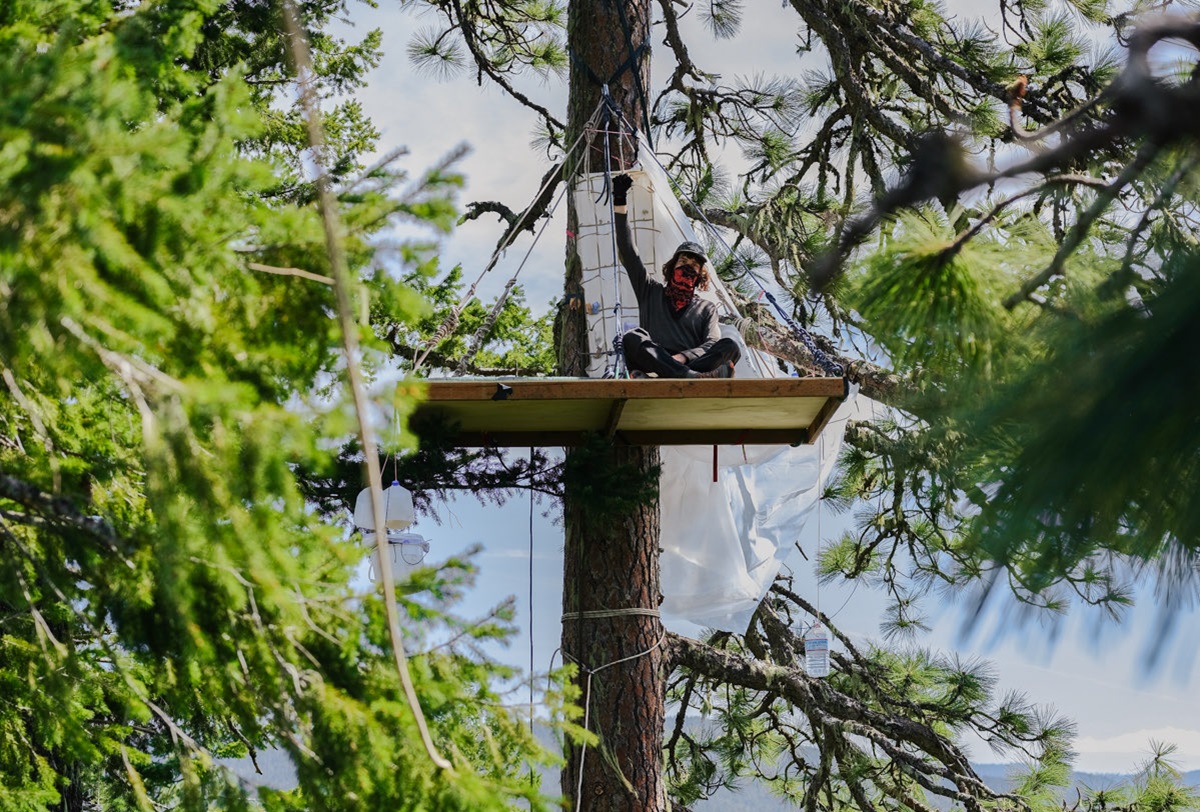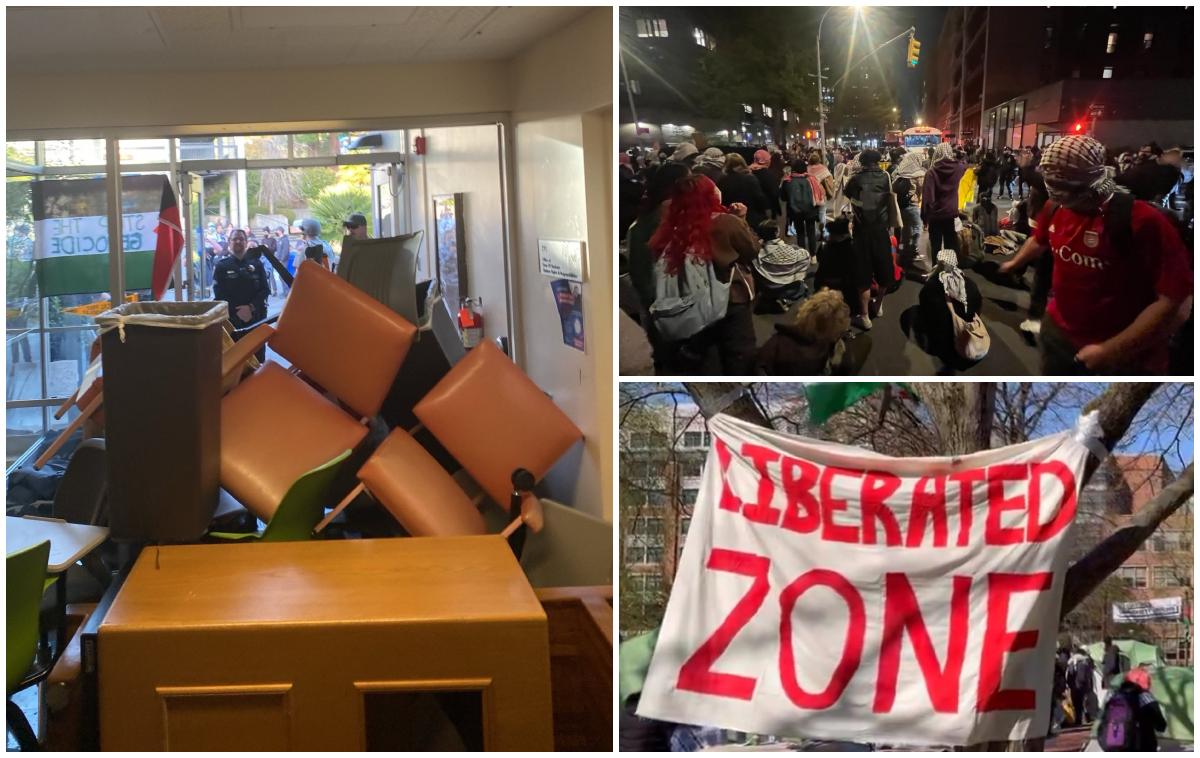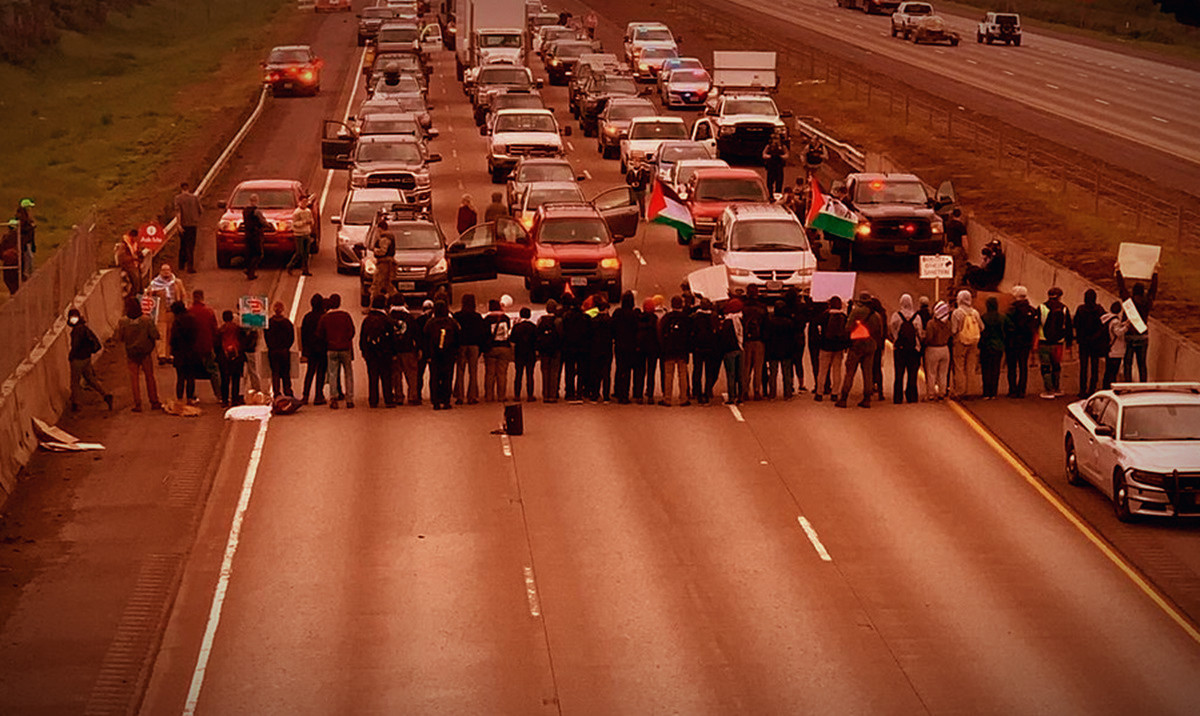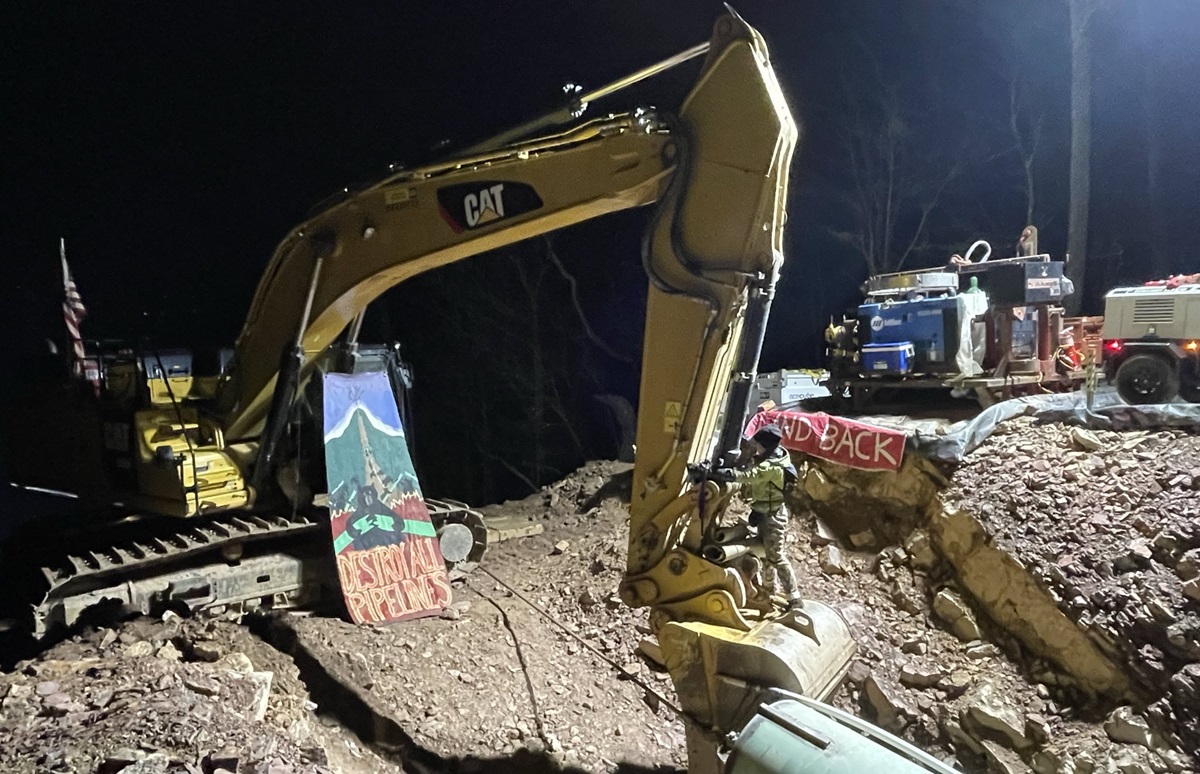Filed under: Anarchist Movement, Bloc Party, Featured, Interviews
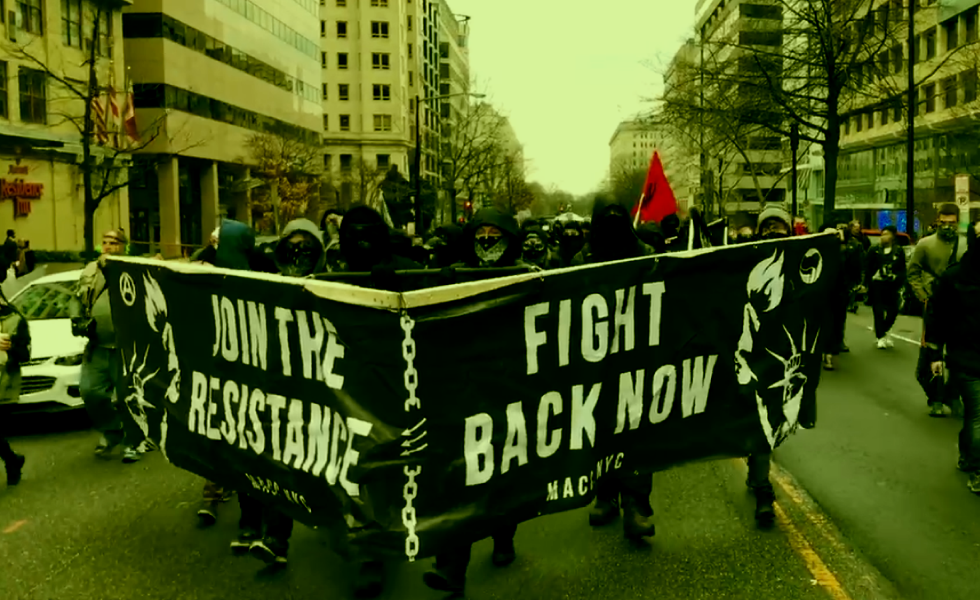
Print PDF and Read Here
Since the polls started rolling in on November 8th we have had countless conversations, received endless text messages or been straight up cornered in a coffee shop with the question of “What should we do? What can I do?” Most of our anarchist friends have shared this experience of old friends, liberal acquaintances or family members who want to know what it is we need to do in order to defeat the Orange Overlord. While some people are still holding onto the shreds of the democratic processes as their savior, most people are recognizing rapidly there is no hope there and we’re going to have to forge new worlds together. IGD published the zine “What Anarchists Have Been Saying for Years and What Liberals Need to Start Hearing,” which is a great analysis on the current state of things and proposals of ways forward. In hopes of taking it to the mattresses together, with comrades old and new alike, we wanted to share something more akin to a “How to Join the Rev 101,” guidebook that you all could pass on to those people at the coffee shop, at family dinners or your Obama-voting neighbor down the street who won’t stop showing you Richard Spencer punch memes.
We’ve been saying for months now that this moment is actually our moment, anarchy’s moment. We stand by that. We hope you’re up to the task with us. Below you’ll find an interview with the author of “How to Join the Resistance,” that we wanted to include with this post-inaugural climate in mind.
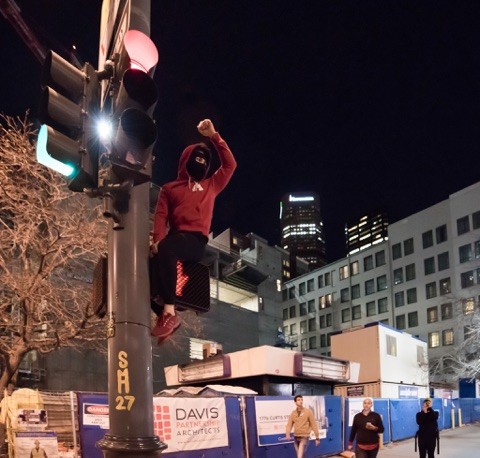
On election night and the immediate days following, a lot of anarchists I know got frantic texts from their more liberal friends asking, “What do we do?,” or some version of that. Was that also your experience and in turn the inspiration for this zine?
Yes, I and a lot of people I know were getting messages from people across the political spectrum—people who hadn’t been very political before who were horrified and looking to get involved; people who had liberal or even radical ideas and limited activist backgrounds but saw a need to do more, to struggle harder and more effectively; even firebrand radicals who had sort of burnt out or fallen away over the years who were like, “we gotta get the band back together.”
It was very heartening, but also a little bit distressing because I felt like I and other people were sometimes at a loss for what to tell people to do or where to begin. When people ask questions like that, they are often looking for something rather immediate, concrete, and accessible. Telling them to just follow some group on facebook or twitter and look for events to go to, or telling them to start their own affinity group or collective is probably a good way to miss out on people’s interest and enthusiasm.
Obviously there are ways to overdo it too. Many authoritarian communist groups have a set mandatory program for new members, which probably appeals to some people, but is really more rigid and dogmatic than anything that what I and many others aspire to. But honestly, some of those authoritarian communist groups have had some relative success in recruiting and plugging people in because it’s very clear how to be involved.
Anyway, in response to all that I had started writing these long-winded messages and emails back to people and after the second or third one I was like, “I should just write one thing that a variety of people might find some use in.” This is the results of that effort. And it’s not perfect at all. It still has a lot of vague suggestions and gaps. But my hope is that it can be a starting place, and people can amend it with local contacts and events and groups and use it as one piece of a larger effort to engage folks and plug them in.
Do you think anarchists are uniquely poised for resistance formations in these dark days? Do you feel we have weaknesses that need addressing?
In many ways, yes. Our experience in grassroots autonomous organizing is invaluable. Our organizing structures allow for a flexibility and dynamism that is crucial in these times. 20 years ago, the RAND Corporation was writing about the strategic advantages of fluid and semi-horizontal network organizing in a world in which struggle is waged in large part through information. A lot of it focused on the Zapatistas. Anarchists have been waaaaay ahead of the curve in this regard.
We’ve also developed particular skills and tactics that are truly invaluable in moments like this: we do the best legal support, prisoner support, militant street tactics, anti-fascist tactics, dance parties. Anarchist theory, disjointed as it sometimes is, articulates the most comprehensive and consistent ethic and vision of human dignity, solidarity, and liberation, which is crucial in the struggle against authoritarianism and resurgent fascism. And anarchists really give the very best hugs.
But we also have weaknesses too. Sometimes all the things that we are good at coupled with a history of getting burned by supposed allies leads us to be pretty self-righteous and stand-offish. We expect people to walk in with a higher level of political education than is perhaps realistic, and maybe not consistent with our own processes of politicization and radicalization, and we don’t always have very strong or consistent political education for new people.
We’re also not great at being particularly strategic. We have expansive visions of liberation, and are great on a tactical level, but it’s the intermediate goals that we are not good at envisioning or building towards. What do we want our movement to look like in 3-5 years and how could we go about getting there? How do we shut down not just this one nazi rally or organization, but this whole sector of the right? What is our strategy for actually resisting the Trump regime? Furthermore, how do we broaden the struggle from Trump specifically towards the entire white supremacist, capitalist, patriarchal system as a whole?
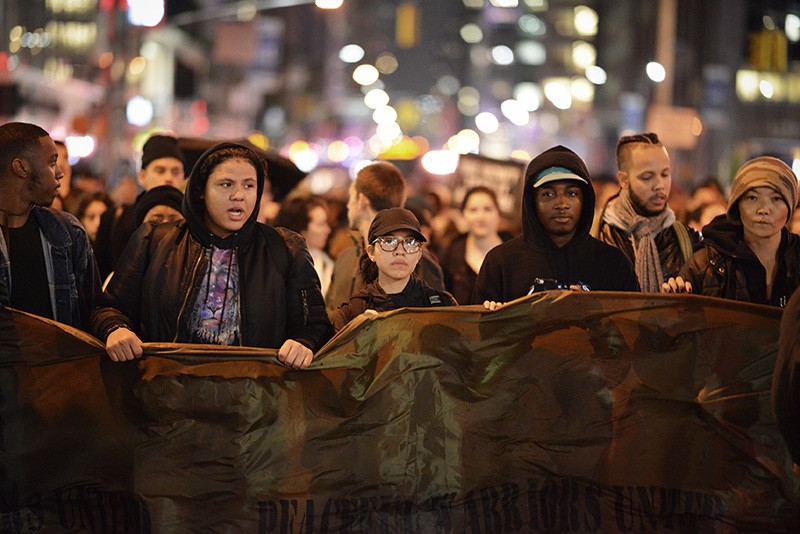
In what ways do you propose we balance security culture with welcoming and hospitality towards new folks?
This is incredibly tough but incredibly important. As repression increases, security becomes more important. But the more intense and elaborate our security practices are, the less accessible and more isolated our movements become, which, paradoxically, is one of the biggest long-term security risks.
There are obviously some fundamental baselines—never, ever talk to law enforcement (except “I’m going to remain silent. I don’t consent to a search. I want to speak to an attorney.”); never talk about people’s involvement in illegal activities. But again, these are principles that have to be affirmatively taught and reinforced. It is not the common sense that many people are born into.
Beyond that, it takes an honest assessment of what the particular risks are of each group or project, and then which security measures are necessary and appropriate. But from a wider view, for each closed anti-fascist group that has no public presence and really tight security, there should be two, three, ten anarchist projects that are open and accessible. Obviously our resources and energy are limited, and reality seldom measures up to our ideals, but I think we should be aiming big.
In D.C. we saw how the black bloc acted defensively when the police attacked children, the elderly and disabled people. As that unfolded I couldn’t help but think of the tag line “you’re friends are the ones in black with masks.” But, really this is becoming clearer to a lot of people. In what ways do you think we can continue to cultivate this discussion and move away from the age old black bloc equals senseless property destruction trope?
I think Ferguson and Baltimore helped change the dialogue around property destruction and militant street tactics. People that were quoting that one MLK line in 2014 about riots being the “language of the unheard,” got a bit defensive when it was quoted back to them in the context of the black bloc. A lot of people still want to fall back on stereotypes and ad hominem arguments about who they assume participates in black blocs (usually rich white men, according to liberals). But then people that were there are like “Actually most of who I saw there were queers, femmes, and people of color.”
That can be difficult, because it’s at least a little bit dangerous and irresponsible to admit participation in a black bloc, or talk about someone else’s participation. So it makes it harder to tell people we know who have misconceptions about anarchism or the black bloc, “Actually, I was in that black bloc and it’s not at all what you think.”
Even within the anarchist movement, there have long been these divisions over tactics and strategy. Plenty of anarchists and other radicals vying for respectability have said things like “Those people in the black bloc are the minority; most of what anarchists do is [some laundry list of community projects and survival programs].” Which is maybe true to an extent, because most of the time anarchists are not marching in blocs, and there are many anarchists who can’t participate (or don’t want to participate) in that kind of action for various reasons. But it is also deceptive, because many of the people in the black blocs are also the ones that are doing the community infrastructure projects and doing the networking and coalition building and all those other things.
By the same token, there have also been anarchists that really have denounced the community infrastructure projects and the like as “liberal” or “totalizing” or part of some inherently authoritarian “program” (often in the same breath as proclaiming their love for a diversity of tactics). These strike me as two complementary sides of a really inane and false division. I’ve always thought that anarchism is the black bloc AND the community garden or health clinic; vandalism AND legal/prisoner support; attacking fascists AND community coalitions. I often feel like anarchism would take a huge step forward if it could embrace both parts of itself a little more enthusiastically. We don’t necessarily have to advertise our other efforts with things like “Jail Support Hotline, brought to you by the black bloc anarchists,” but a little more embrace of the duality, of “they are us and we are them,” would be good.
Would that change popular perceptions of anarchism or the black bloc? Will we ever be as recognizably anarchist to the world as when we are dressed in black with masks on our faces? Will we organize a black bloc that can resist the lure of the first Starbucks or Bank of America window to intervene a bit more strategically? I don’t know, but maybe.
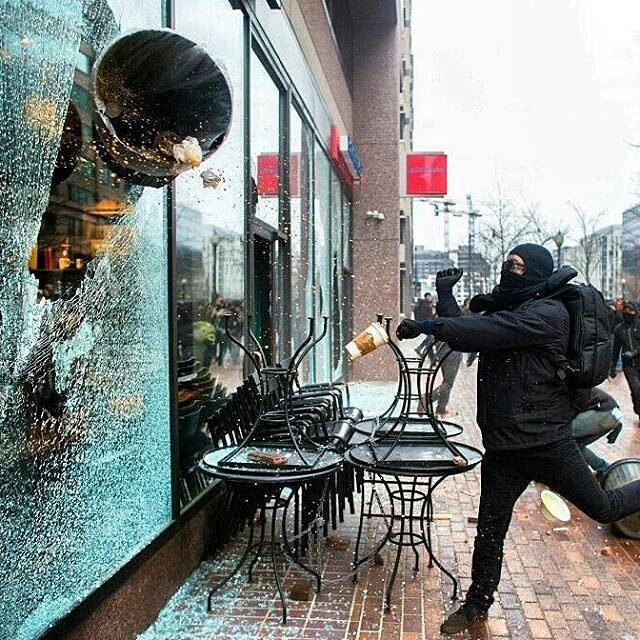
If you could give a word of advice, encouragement or even warning to anarchists in the U.S. right now, what would that be?
There is a lot of possibility in the world right now and we shouldn’t give up, even though it feels pretty bleak at times. When things are in flux as much as they are right now, it creates opportunity. People are increasingly looking to collective and autonomous action to exercise power; more people are sympathetic to militant tactics and radical visions of what is possible and desirable. Trump’s candidacy and presidency have created some serious divisions in the ruling class, which destabilizes power and creates vacuums. To the extent that those vacuums can be filled with anti-authoritarian and anti-capitalist principles and organizing, we could see some significant victories for our movements.
But there is also a lot to lose. If Trump’s regime (which it is increasingly apparent is being led primarily by the white nationalist Steve Bannon) is able to consolidate power, things could get very ugly very quickly. Germany 1933 or Chile 1973 for example. If the military or the CIA or Congress or some other body attempts to remove Trump and Bannon from power, civil war could easily erupt, a la Syria. The possible permutations are endless but all of them seem pretty brutal and bleak.
On that note, people should think about their plan B, or C or D. In this age of pervasive and virtually omnipotent surveillance, going into hiding or sneaking out of the country isn’t something that can be done without advance planning. If you can’t use your cell phone, computer, tablet, car, ID, or credit/debit cards, and you can’t go to your house or those of your family or closest friends, what are you going to do? How will you find and contact your people? Where will you go and how will you live?
The old rules and the old common sense no longer apply. Anarchists have never cared much for rules or common sense, so by itself this isn’t a bad thing. But the fight for what will take its place is well under way, and the authoritarians and fascists have a head start in at least some areas. But nothing is inevitable.
Know your history, dream the future, organize your people, and fight to win.

How to Join the Resistance: Ideas for Fighting the Trump Regime and Becoming Ungovernable
“I’m totally horrified! What can I do???”
“I don’t really consider myself an activist, but this is just too much. But I can’t figure out where to begin.”
“I’ve never been very political before, but I feel like I need to actually DO something.”
So many people have been having the same feelings over the past days, weeks, months. Even some of the people that saw this horror show coming have been somewhat stumped on where to begin fighting back—both for themselves and other interested people. What follows is not a prescription, strategic blueprint, or exhaustive guide to the resistance. It is a set of ideas, suggestions, and resources geared primarily towards those who might be relatively new to autonomous, grassroots, political action. Plenty of guides have been written elsewhere about pressuring and lobbying elected officials; none of that is included here. Please distribute widely, and include any local organizations, groups, events, or contacts as appropriate.
These are indeed dark and frightening times. But the future is up for grabs and the resistance is everywhere and increasingly preparing to fight like hell for human dignity, solidarity, and liberation. Welcome!

Develop a firm commitment to non-cooperation and non-collaboration.
Non-collaboration and non-cooperation are the very minimum base line for joining the resistance. Don’t be fooled by efforts to normalize the Trump regime and authoritarian, racist, misogynist policies. Remember the horror and outrage you felt on November 9 and why you felt that way. All manner of cowards in the media, politics, and society will seek to normalize the new regime. Some are self-interested and just looking for a piece of the pie or to try to avoid repression; some fetishize “peace” and the absence of conflict over justice and freedom; some are just fools. Trump will (and already has) made efforts to at times seem less extreme, less authoritarian, more conciliatory. But this is essentially just gaslighting—attempts to confuse and disorient the opposition, and ultimately consolidate his own power. And actions always speak louder the words—he can say whatever he wants but one of his very first cabinet appointments is a literal white nationalist, so really the rest is just propaganda.
Part of the attempt to normalize the Trump regime includes praising common goals that some might share with Trump. For example, many liberals have spoken favorably of his trillion dollar infrastructure spending plan or his opposition to multi-lateral trade agreements like the TPP. But the legitimacy he gains from such outreach and collaboration is currency he can use for more insidious purposes. Every autocrat has some programs that are helpful. Even Hitler was a major force in building the autobahn in Germany. But that doesn’t make the regime more legitimate or less authoritarian. And also Steven Bannon, the aforementioned white nationalist, is the one taking credit for Trump’s infrastructure plan, so…
There will be backlash for our resistance. We must organize and prepare in advance for the coming repression, and a big part of that means taking care of each other and having each other’s backs, and not participating or cooperating in the repressive strategies meant to destroy the resistance.
Absolutely under no circumstance cooperate with law enforcement investigations into political movements or talk to law enforcement as part of such investigation. Even if you don’t think you have any information or anything to hide, talking to law enforcement is dangerous for yourself and everyone else in the resistance. They are gathering intelligence, mapping communities, and planning increased and targeted repression. Every major police union in the country endorsed Trump’s candidacy, the FBI intervened in the election on Trump’s behalf, and it is barely an exaggeration to say that all cops are Trump supporters. Donald Trump is not personally going to deport a single person, crush a single protest, register a single Muslim—it is cops that will do all of that. Never talk to cops, never consent to a search, always ask for an attorney. These are your rights, so use them or lose them (literally).
Also, resist efforts to divide movements between “good” versus “bad” protesters, “outside agitators” versus “local community,” and “peaceful” versus “disruptive/violent” protesters. These are strategies the state employs to divide movements, isolate certain elements to target with violence, and manage/co-opt the others. Genuine solidarity is the only way we are going to make it through this shit storm.
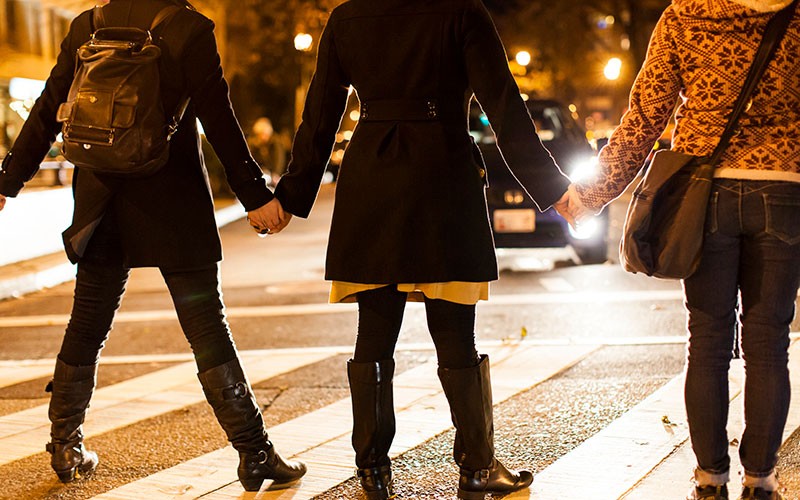 Often times, people and groups will disagree over questions about tactics and strategy—what is most effective? What is necessary? What is moral or ethical? These debates can be important and useful if done in the spirit of solidarity and mutual growth. However, sometimes these debates become really damaging when some people presume to know the one “right” answer that everyone else must follow—attempting to control the actions of others, publicly denouncing those that don’t fall in line, and sometimes even working with police to criminalize and repress those with whom they disagree or can’t control. Even the public denouncements undermine the resistance by driving a wedge in the movement, and signaling to the regime that if they target the other group, fewer people will be willing to come to their defense.
Often times, people and groups will disagree over questions about tactics and strategy—what is most effective? What is necessary? What is moral or ethical? These debates can be important and useful if done in the spirit of solidarity and mutual growth. However, sometimes these debates become really damaging when some people presume to know the one “right” answer that everyone else must follow—attempting to control the actions of others, publicly denouncing those that don’t fall in line, and sometimes even working with police to criminalize and repress those with whom they disagree or can’t control. Even the public denouncements undermine the resistance by driving a wedge in the movement, and signaling to the regime that if they target the other group, fewer people will be willing to come to their defense.
In 2008, a diverse coalition of groups organizing to protest the Iraq war and the Republican National Convention in the Twin Cities adopted a set of four principles, since known as “The St. Paul Principles,” to help avoid some of these pitfalls:
- “Our solidarity will be based on respect for a diversity of tactics and the plans of other groups.
- “The actions and tactics used will be organized to maintain a separation of time or space.
- “Any debates or criticisms will stay internal to the movement, avoiding any public or media denunciations of fellow activists and events.
- “We oppose any state repression of dissent, including surveillance, infiltration, disruption and violence. We agree not to assist law enforcement actions against activists and others.”
The St. Paul Principles were very effective at maintaining a high level of solidarity within the coalition, which proved invaluable when state, local, and federal law enforcement started making preemptive arrests and raiding houses and organizing spaces before the protests even began.
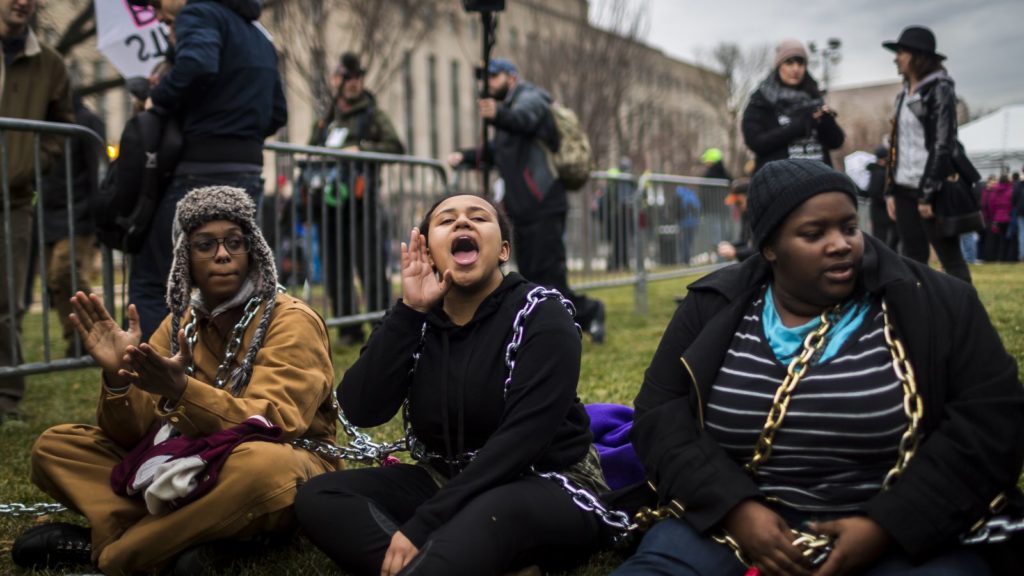 Resisting Trump, resisting resurgent fascism, and fighting for liberation require a genuine diversity of people, groups, ideas, and tactics. It will also take a tremendous amount of humility and patience. It will sometimes be messy and conflictual, and we will not always get along or necessarily even like each other. But there really are no points for self-righteous moral high ground if we lose this fight. If you think you can be part of the resistance while acting in such a way to make other resisters more vulnerable to the state, you are wrong. Doing so makes you not a resister, it makes you a collaborator. An injury to one is an injury to all.
Resisting Trump, resisting resurgent fascism, and fighting for liberation require a genuine diversity of people, groups, ideas, and tactics. It will also take a tremendous amount of humility and patience. It will sometimes be messy and conflictual, and we will not always get along or necessarily even like each other. But there really are no points for self-righteous moral high ground if we lose this fight. If you think you can be part of the resistance while acting in such a way to make other resisters more vulnerable to the state, you are wrong. Doing so makes you not a resister, it makes you a collaborator. An injury to one is an injury to all.
Two articles on non-collaboration, and one on the St. Paul Principles:
- “Autocracy: Rules for Survival”
- “Trump: The Choice We Face”
- “A Principled Stand on Diversity of Tactics: Avoiding Uniformity of Failure”
Knowledge is power. Arm yourself.
Where did this come from? How did we get here? What precedent is there for this? Where might this be going? The more you know about the history of this country, the history of prior resistance movements for social justice and liberation, the history of political repression, etc., the more effective you will be as a resister. And this isn’t only about Trump. The structures of the colonial, white supremacist, capitalist, hetero-patriarchy run wide and deep. Understanding them is crucial to dismantling them.
Perhaps you could organize a reading/study/discussion group with your friends. Just don’t get paralyzed by the enormous wealth of information and knowledge available. The purpose is not merely to understand the world, but to change it. And some of the best knowledge and consciousness comes from experience—from doing and succeeding or failing. So start with a couple articles, or a book—something that interests you—and go from there.
Here’s a list of resources if you are looking for places to start:
- “Thinking Strategy and Defense in the Face of Fascism and the New Regime”: An interview on the IGD podcast about the election, Trump, fascism, and our next steps to move forward.
- “White Supremacy by Joel Olson”: This short essay by Joel Olson about what white supremacy is and how it works is fantastic and you should read it, share it, print it out, make all your friends read it.
- “Counterinsurgency and the Occupy Movement,” by George Ciccariello-Maher: An excellent and necessary article about repression and solidarity.
- “If an Agent Knocks” by the Center for Constitutional Rights: An essential pamphlet on knowing your rights and not cooperating with law enforcement.
- “A Time for Treason”: A very comprehensive (perhaps overwhelming) reading list of books and articles relevant to our current context.
- “#BlackLivesMatter: A Longform Reading List”: This reading list consists entirely of longform interviews, essays and articles available online by Black people about the experience of being Black in the white supremacy of America, police violence, the U.S. government’s undeclared war on its Black citizens, and Black freedom struggles.
- “#TrumpTheRegime: Resources and Ongoing Resistance to Trump and the Far-Right”: A cursory reading list of materials that are all available online
- “From Protest to Resistance: Thoughts on Organizing for the Future”
- “Three Way Fight” & “Anti-Fascist News”: For analysis of fascism and anti-fascism in particular, these two blogs are great.
- “Towards a Transformative Anti-Fascism”
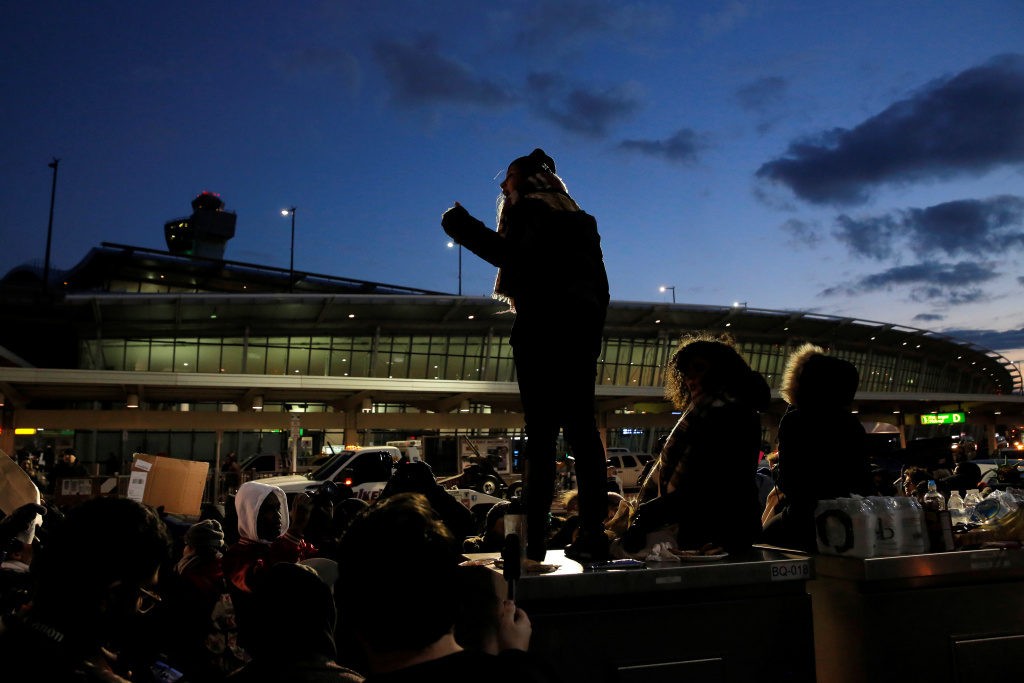
Speak your mind, even if your voice shakes.
The point of speaking out against Trump, the police, the fascists, the collaborators, the entire white supremacist, capitalist patriarchy, is not always to convince other people. Yeah, sometimes maybe you want to change someone’s mind. But there are 1000 other reasons to share your thoughts with the world. Sometimes you just want to let the enemy know that nowhere is safe for them to peddle their oppression and that they will be confronted and challenged wherever they go. Sometimes you want to troll them and waste their time/energy and entertain yourself coming up with creative new insults.
Sometimes you want to sharpen your arguments and analysis so when you do want to convince someone, you are that much more skilled at making your point. Sometimes you just want to plant a seed that maybe one day down the road will grow into something more. Maybe you want to lend comfort and courage to anyone listening who is already on your team but might feel kind of alone or silenced. Maybe you want to share a new analysis or idea with your allies. Maybe you want to raise that flag to find new allies and get them involved in the resistance as well.
So be that person at dinner. At work. With your friends. On the street. Some people will feel uncomfortable with your voice, your opinions, your ideas. That’s ok. That’s good. These are discomforting times, and we will all need to push the boundaries of our comfort zones, in thought, word, and deed. Speak out against whatever injustice you perceive. Speak out against the regime, as well as the media and politicians who try to normalize the regime or collaborate with it. Speak out against the repression and backlash that the resistance will face. Speak out against those who want to contain, manage, co-opt, or exploit the resistance.
Diversify the ways you communicate: written word, spoken word, music, visual art, memes, propaganda, videos, etc. Branch out from the interpersonal to the public and practice your public speaking or talking to the media.
The more you speak, the more it is also important to listen and ask questions. Other people have valuable experiences, ideas, and feelings too, and often times, knowing when to shut up and leave space for others can be at least as valuable. Amplify other voices that have valuable insights, good analysis, solid strategy—especially those voices that are the most marginalized. And remember that talk is cheap and social media is a wasteland and a trap.
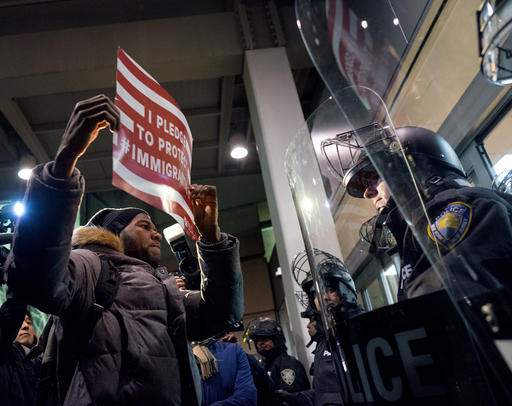
Cash Rules Everything Around Me (so donate generously).
The resistance is frugal and efficient, but it still costs money: bail money, legal fees, transportation, printing costs, art supplies, postage, media equipment, server space and hosting fees, advertising, professional training, feeding the rebels, first aid supplies, self-defense equipment, and more.
Try to donate to groups that are doing the most cutting edge work (pushing the struggle forward, not tailing it from behind), the groups with the best politics, the groups that are the most marginalized, the groups that most need your money and will make it go the furthest. Do what you can to stay away from the Red Crosses of the left-activism world—the big national non-profits that spend a lot of money lobbying the halls of Power but precious little building real movement/community power from the bottom up. Find something rad and local when you can. Organize a fundraiser like an educational film screening or a concert or a weekend brunch where you take donations for the resistance.
Here are some groups doing cool and important work:
- The ACLU is fine, but the Center for Constitutional Rights, the National Lawyers Guild, and the Civil Liberties Defense Center all do more cutting edge and movement-focused work.
- “13 Intersectional Grassroots Organizations to Donate to Right Now”: This is a list of intersectional, feminist, anti-racist organizations doing a variety of work from the local/regional level to the national that could all use some dollars.
- The Anarchist Black Cross does amazing anti-repression work and support work for U.S. held political prisoners (all those who find themselves in prison for resisting the white supremacist capitalist patriarchy).
- Rising Tide North America is a network of local groups organizing community based solutions to climate change and direct action to confront the root causes of climate change.
- It’s Going Down has excellent radical media, reporting, and analysis (mostly written words and audio). Choosing sides, getting organized.
- SubMedia is rebel media and video production in the streets since 1994.
- Rise Up provides email and other online communications tools for the resistance.
- Just Seeds Artists Cooperative, because the resistance is beautiful.
- If you’re donating, you might as well ask if there are other ways to get involved as well!
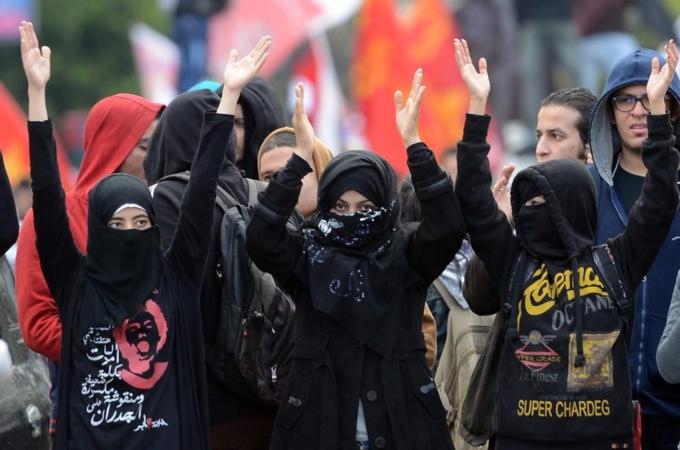 Bringing the ruckus.
Bringing the ruckus.
This is the part you were really asking about right? Because you already knew you were kind of tired and bored with facebook posts and change.org petitions and calling your collaborator congressperson, and you want to actually DO something—to build and exercise power, to feel comraderie and solidarity, to experience danger and exhilaration and the budding sense of our own agency and potential.
Protests and marches and rallies oh my! Exercising power, agency, and autonomy publicly in the face of authoritarianism; meeting and bonding with like-minded neighbors in the streets in the face of alienation, fear, and marginalization; creating situations of unpredictability, ungovernability, and volatility in the face of “law and order;” a refusal to sit quietly or peaceably as the white supremacist capitalist patriarchy tries to steam roll over everything and everyone we love.
The simplest protest is just organizing some people to go stand on a visible, well-trafficked corner with some homemade signs and maybe some chants planned out. But maybe there is a particular profiteer or collaborator that you want to draw attention to and embarrass or inconvenience. A bank, a politician, a contractor, etc. Maybe there is a sympathetic journalist you can alert ahead of time to get some media coverage. Maybe there are other interested groups that you can reach out to and coordinate with to help promote and execute the protest.
Protests are important but sometimes feel like little more than public and dramatic speaking—a ritualized, collective facebook message in real life. This can indeed be a part of the resistance. But maybe you feel like that isn’t enough. Maybe you want to cause a disruption to highlight the fierce urgency of the situation. Or maybe you want to directly interfere with the functioning of some profiteer or collaborator or even the direct actors of the regime—an ICE detention facility or the cops that round people up for it; the politician that keeps supporting the regime and ramping up the sexism and xenophobia; the transportation routes that keep the whole system running. Consider civil disobedience! Blockades can range from a few people linking arms to one or more people elaborately locking themselves to doors, gates, roadways, elevators, busses, trains, construction equipment, etc., etc., etc.
Sabotaging the machinery of the regime can take civil disobedience to exciting new levels! The sky is really the limit.
As you get involved in the resistance, you will find that an outsized portion of the activity is not the daring glamour that you might have imagined. It is staying up all night fielding phone calls from jail and tracking down people’s friends to bail them out. It is waking up early to cook a lot of food for everyone before the conference or protest, and then missing the “real action” to do the dishes. It is sending a lot of emails and text messages to coordinate transportation and housing. It is spending all weekend at a first-aid training so that someone in your group knows how to treat for tear gas or stab wounds. It is watching people’s kids so that our movements can include everybody. A good ruckus requires a tremendous amount of logistics and support work.
Be bold, daring, and as brave as you can be. Freedom is at stake.
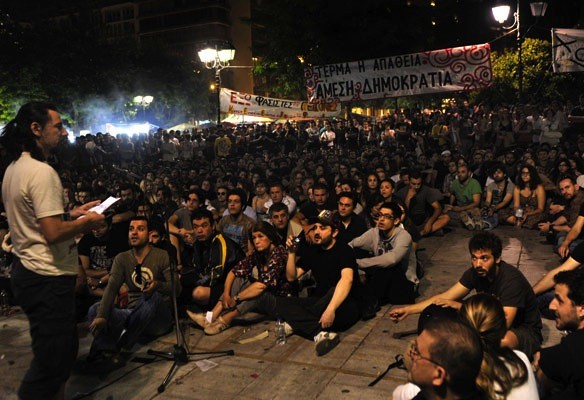 Organize defensively.
Organize defensively.
As mentioned above, our resistance will have backlash. The resistance is not the cause of this backlash—authoritarianism is the cause. Do not fall into the trap of victim blaming—just as wearing a short skirt, being flirtatious, or any other behavior is never, ever the cause of being sexually assaulted, blocking a street, breaking a window, or beating up a fascist is never the cause of being tear gassed, beaten, arrested, surveilled, investigated, or imprisoned. That is all coming for us no matter what (as long as we have the nerve and the principle to be worth a damn). Since we know it is coming, we should prepare in advance.
Some of that backlash will be from the state, in the form of house raids, arrests (both the indiscriminate and the targeted) and prosecutions, FBI investigations, surveillance, harassment, and more. Don’t be fooled into thinking that your cooperation or compliance will protect you. Never talk to law enforcement; never consent to a search; always ask for an attorney. Have legal support set up ahead of time. Have some money set aside for bail and or lawyers. Offer support (financial, material, emotional, political) for others who get targeted, even (especially) when you maybe disagree with them or don’t like them. It is the activists who the state perceives as most isolated, most marginal, most vulnerable that they often target for the harshest repression. Solidarity is our strongest weapon.
Also think about improving the security of your digital life.
Some of the backlash will come from the grassroots far-right—the fascists and quasi-fascists and militias and their ilk. Know what risks you are facing and take the steps necessary to protect and defend yourself. Possible tactics they use include disseminating personal information about you for campaigns of harassment and threats; vandalism/sabotage of your property; stalking behavior; blacklisting; physical attacks (at home, when you are out and about, when you are at protests or public meetings). Increase you capacity for self-defense and share those skills with other members of the resistance. Create phone trees or rapid response networks to respond in emergencies.
Defense also means taking care of yourself and the people around you. Most folks are going through waves of mourning or grieving as well as shock and panic, as the dreams and visions and goals we had for ourselves and our loved ones are suddenly threatened in new and sometimes unexpected ways. Make space for that—by yourself and with your people. Grieving is a process that usually doesn’t have shortcuts. Focus on the activities, practices, and relationships that make you feel whole and strong and supported and loved; perhaps reconsider the ones that don’t. Give voice to your fear and encourage others to do the same. Ask your people what they need, and tell them what you need. The resistance is fierce and strong, but the resistance is also tender and vulnerable. These are not at odds with each other, but rather complement one another. Ultimately the resistance is human and must not lose sight of its humanity.
To quote Cindy Milstein: “When almost nothing remains, what remains is to defend memory, what remains is to not become desensitized to the normalization of violence, of this damned violence that sometimes seems so far away and at other times slaps us in the face. What remains is to turn our backs on the individualism imposed by the market’s logic, on this ridiculous ‘everyone for themselves.’ What remains is solidarity.”
- “This is What Community Self Defense and Solidarity Looks Like, or Should!”: See Cindy’s list of ideas, strategies, and tactics for community defense.
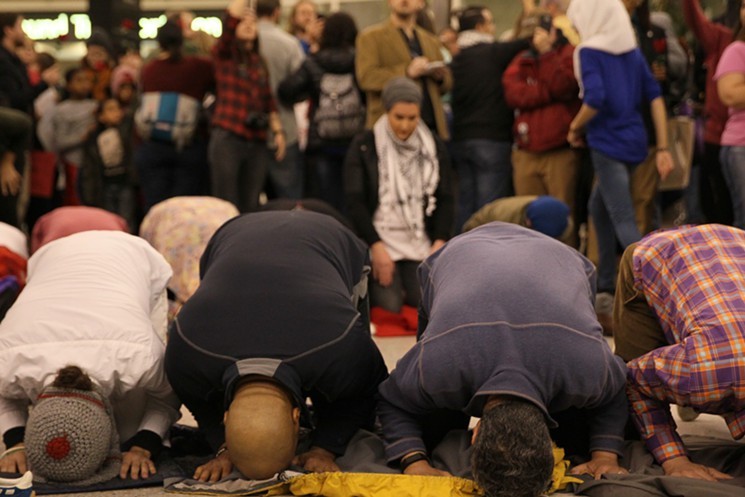 The secret is to begin.
The secret is to begin.
Often times, people want to find a group to join or person to guide them in how to get involved in the resistance. If you are able to find such a group or person in your area, fantastic. But unfortunately a lot of people live in areas where such a group does not exist (yet). Or maybe there is a group but all they do is navel gaze; or maybe they are cliquish and pretentious and condescending; or maybe they don’t really share your values; or maybe they are just paranoid and don’t trust you. If you live in one of those places or otherwise can’t find a group you want to join, does that mean you can’t join the resistance? Hell no!
For many people, their first involvement in politics and activism isn’t through a particular organization or group. Rather, they (1) find a thing they care about, (2) find some friends that also care about that thing, and (3) make a plan together to do a something about that thing. When starting out, many people begin fairly modestly: making a banner for a protest, distributing radical literature in their social circles, holding informal meetings of friends to scheme new ideas.
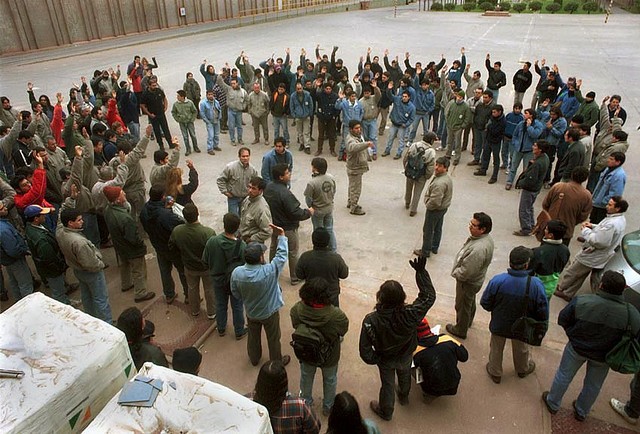 The power of initiative and creativity cannot be understated. And once Donald Trump and Stephen Bannon and Jeff Sessions label our radical dissident political organizations illegal and treasonous, informal networks of friends and our own courage to act might be all we have left.
The power of initiative and creativity cannot be understated. And once Donald Trump and Stephen Bannon and Jeff Sessions label our radical dissident political organizations illegal and treasonous, informal networks of friends and our own courage to act might be all we have left.
Here are some resources that you might find useful as you dream and scheme:
- “Resources for Anti-Fascist Action”: This page focuses on anti-fascist organizing, but has links to a lot of resources that are more generally applicable for organizing and activism (organizing protests, running meetings, talking to the media, etc).
- This book, “Recipes for Disaster”, is a pretty good handbook for various activist tactics/strategies, from the serious (blockades, banner drops, legal support) to the kind of silly (how to make a record player out of a bicycle). Also a fair dose of fanciful political theory.
- The Earth First! Direct Action Manual is a real classic with a wealth of ideas and information.
Even when you do find a local group that interests you, it can sometimes be intimidating to get involved. Maybe follow them on social media or get added to their email list serve to get a feel for what they do. Attend any public events they have (meetings, protests, fundraisers, lectures, etc.). Ask how you can get more involved or what they need. Sometimes even the best and most well-meaning groups can have problems plugging new people in, so try to be patient. Or offer to help do outreach for them!
The point is not to find the “perfect” thing to do, but to find something that speaks to you and/or that you can make valuable contributions to and get involved in whatever way makes the most sense. Maybe you’ll try several things before you find what fits best.



